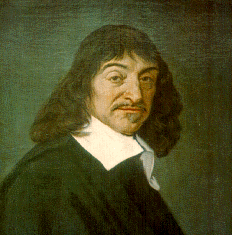

Renato M.E. Sabbatini, PhD

A towering figure of Western intellectual history, René Descartes was a French philosopher, physiologist and mathematician, born on March 31, 1596, at La Haye (in the provice of Touraine, France). He was a contemporary of Galileo and Pascal and thus worked under the influence of the religious repression of the Inquisition.
Early in his life, just after joining the army in 1617, Descartes found that he had a talent for mathematics, so he spent most of his army's years and afterwards (he resigned his commission four years later), studying pure mathematics, particularly analytical geometry, a field which became his main contribution in this area. In 1626 he settled in Paris, but was persuaded to move to Holland, then a country at the height of its power, in 1628. He lived there for the next 20 years, devoting all his time and efforts to mathematics and philosophy and to the pursuit of truth. In 1649, at the invitation of the Queen of Sweden, he went to Stockholm to become the Queen's teacher, but he died a few months later, on February 11, 1650, of acute pneumonia.
Descarte's work in philosophy and science was published in five books: Le Monde (The World) an attempt to describe the physical universe, Discours de la Méthode Pour Bien Conduire Sa Raison et Chercher La Vérité Dans Les Sciences, (Discourse on the Method Of Rightly Conducting Its Reason and Searching for Truth in the Sciences), his most important work; Meditationes, a summary of his philosophical ideas, the Principia Philosophiae (Principles of Philosophy) the greater part of which was devoted to physical science, especially the laws of motion; and Les Passions de L'ame (The Passions of the Soul), his most important contribution to physiology and psychology. Descarte's contributions to physics were mainly in optics, but he wrote extensively on many subjects, including biology, brain and mind, etc. He was not an experimentalist, though.
The mainstay of Descarte's philosophy can be subsumed by his famous phrase in Latin: Cogito, ergo sum (I think, therefore I exist). He was the first to raise the doctrine of mind/body dualism, to propose a physical seat for the mind, and the way it interrelates to the body. Thus, he discussed important issues for the neurosciences which were to dominate the ensuing four centuries, such as voluntary and involuntary action, reflexes, consciousness, thinking, emotions, and so forth.
Renato M.E. Sabbatini, PhD
Brain & Mind Magazine
Copyright (c) 1998 The State University of
Campinas, Brazil
Center for Biomedical Informatics